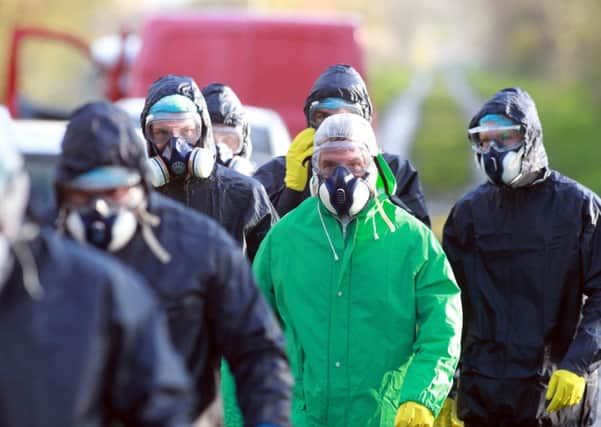Ducks culled as vets call for ‘biosecurity lockdown’


A cull of 6,000 ducks at the farm in Nafferton, near Driffield, where the “highly pathogenic” virus has been found, was under way yesterday, officials said.
A spokesman for the Department for Environment, Food and Rural Affairs (Defra) said the disease was the H5N8 strain, the same as that confirmed at a chicken farm in the central province of Utrecht, the Netherlands, and in Germany.
Advertisement
Hide AdAdvertisement
Hide AdBut the advice from the chief medical officer and Public Health England remained that the risk to public health from the virus is “very low” and the Food Standards Agency has said there is no food safety risk for consumers.
The Defra spokesman said: “As part of our robust action in response to the confirmed case of avian flu, the culling of 6,000 ducks on the affected farm in east Yorkshire is under way.”
They said the cull was being carried out in a “safe and humane manner” by fully-trained staff from the Government’s Animal and Plant Health Agency.
“Our response to this outbreak follows tried and tested procedures for dealing with avian flu outbreaks and we expect the cull to be completed later today (Tuesday). Additionally, our animal health laboratory at Weybridge has confirmed that the outbreak of avian influenza in East Yorkshire is the H5N8 strain.”
Advertisement
Hide AdAdvertisement
Hide AdThe cull of ducks at the farm owned by the UK’s largest produce of duck and duck products, Cherry Valley, follows a ban on the transport of poultry and eggs throughout the Netherlands after the H5N8 outbreak in Utrecht.
Officials are still investigating how the virus reached East Yorkshire, whether it could be linked to the commercial transport of birds, or carried by wild birds.
The outbreak is the first serious case of bird flu since 2008, when the H7N7 strand was found in free-range laying hens near Banbury, Oxfordshire.
Most types of bird flu are harmless to humans but two types - H5N1 and H7N9 - have caused serious concerns.
Advertisement
Hide AdAdvertisement
Hide AdChief veterinary officer Nigel Gibbens said the Cherry Valley farm at the centre of the alert had good bio-security in place and so the risk of spread is “probably quite low”.
But Keith Warner, president of the British Veterinary Poultry Association warned that there could be more incidents.
“Everybody in the UK that owns birds in any number should be on biosecurity lockdown,” he said.
Festive birds supplies ‘safe’
Poultry industry officials said there was no indication that the bird flu outbreak would disrupt the supply of Christmas turkeys.
Advertisement
Hide AdAdvertisement
Hide AdAndrew Large, chief executive of the British Poultry Council, said: “The birds on the duck farm in Yorkshire are being slaughtered and the farm will then be thoroughly disinfected. The current outbreak has a 10km restriction zone and this will have no impact on the supply of turkeys for the festive period.”